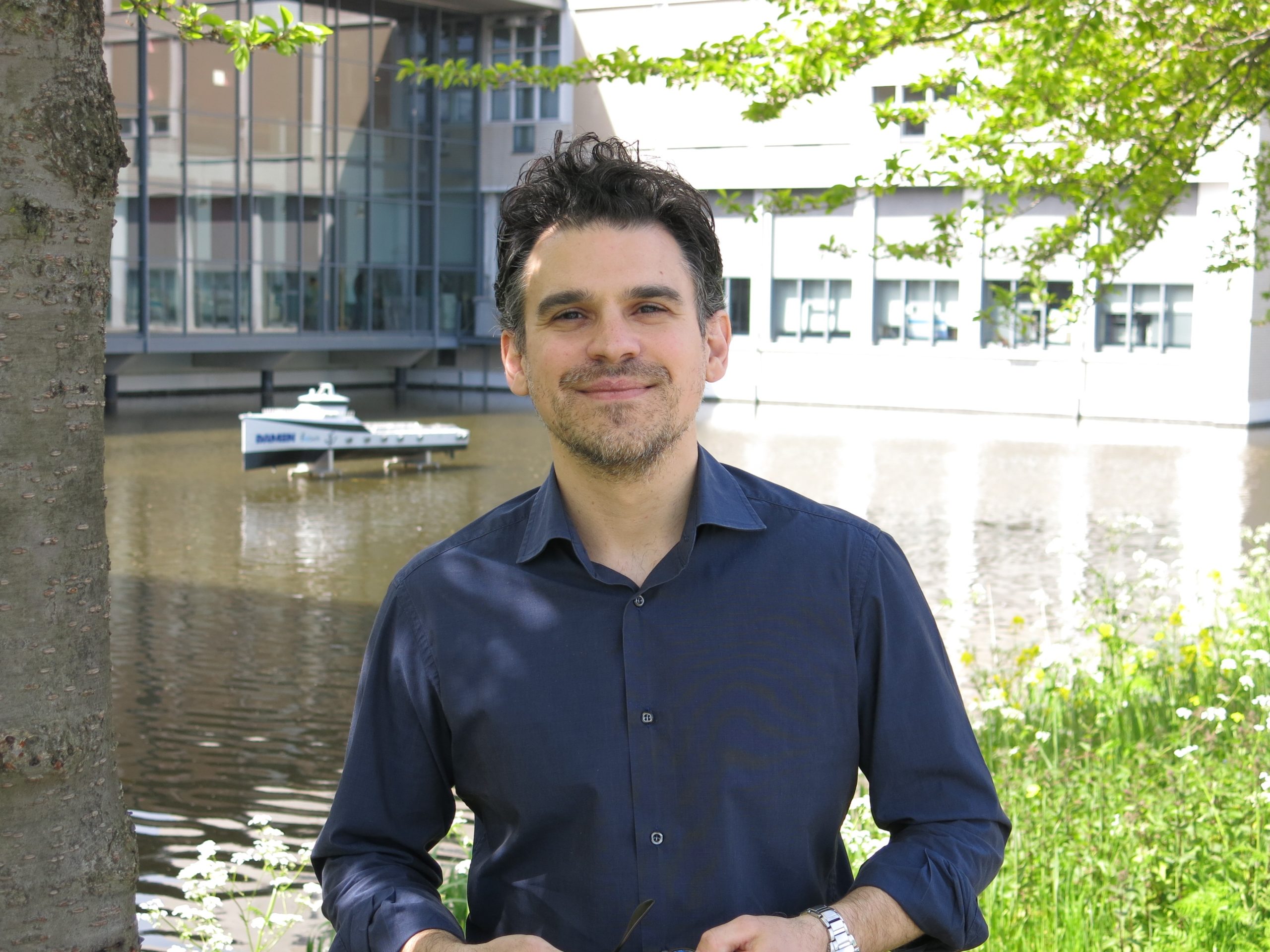Who are the people who study or work at TU Delft? Meet them in this series. This time Assistant Professor Othon Moultos, who studies tiny things that could make a big impact.
Othon Moultos: “We want to design a new generation of adsorbents that can selectively adsorb, especially PFAS and other micropollutants.” (Photo: Heather Montague)
English only
“In my group, we work on molecular thermodynamics. It’s under the umbrella of thermodynamics which is the branch of science dealing with energy and work in any physical system, for example how temperature and pressure can affect the properties of materials. Thermodynamics is pretty much everywhere around us, in everyday things like engines in cars or airplanes, in all the basic concepts around heating and air conditioning, and in cooking. My expertise is in molecular thermodynamics, meaning we do simulations at the molecular level. Molecular thermodynamics and research at the nanoscale are very important and necessary for macroscopic applications since everything is made of molecules. Within that, I have two research directions.
The first one is on energy, mainly studying hydrogen systems. We do research covering a big part of the value chain of hydrogen systems. For example, on how to produce hydrogen. Now, it’s mainly produced from oil and gas, but we know we need to boost electrolysis, which is splitting water into hydrogen and oxygen, and electrolysis needs a lot of thermodynamics. In particular, you need to know a lot about the properties of the solvents and the hydrogen itself at specific thermodynamic conditions. Other focus points of our research are in hydrogen transport. There are plans for transporting it in the pipelines that we have for natural gas, but if you do that you don’t know if the structural integrity of the pipelines is going to be affected and how. Again, you need to know the properties at the molecular level. We also study hydrogen storage in materials and tanks, and processes for compression, and guess what, these applications require a lot of thermodynamics.
‘We need new adsorbents that can selectively adsorb chemicals like PFAS’
The other research direction is mainly related to water treatment, and I recently received an NWO grant for this. It’s not large-scale water treatment like what companies or municipalities do. It’s about designing tailor-made materials, adsorbents, that can selectively remove harmful chemicals from water. We design the adsorbents at the molecular level using computer simulations, and then we work with companies and authorities to try and upscale them, to make a filter out of them.
Now, all the micropollutants, like the chemicals that our bodies expel in water such as leftovers of drugs (pharmaceuticals) or from hormones, all go into wastewater. Just think about leftovers from personal care products or pesticides. All of these things become like a soup of chemicals that react with each other and create very complex chemicals. But these chemicals are very small in scale, not like a plastic bottle or even microplastics that you can still feel. They are actually at a trace level. Micropollutants are usually treated with activated carbon, like the filters that some people use at home. This is a material that has been used for a long time and it can adsorb specific chemicals but it’s mostly developed through trial and error over the years, and it’s not really sustainable.
Now we have emerging pollutants like PFAS and the important thing about these components is that there are thousands of different types and the concentration increases because you get them from different industrial processes. PFAS are persistent components that can be very toxic to humans and animals. Thus, the regulations in the EU are becoming very strict. The trouble is adsorbents like activated carbon can’t really comply with the new regulations. So we need new adsorbents that can selectively adsorb these chemicals. In this new NWO project, we want to design sugar-based adsorbents. These adsorbents are based on sugar molecules, polysaccharides which we get from starch. Then you polymerise them using linker molecules which connect the sugars to each other to make a polymer adsorbent. We want to design versions of these that will be way more sustainable compared to activated carbon.
‘We can process chemical data with computer simulations’
There are already versions of this adsorbent but the idea of this project is to find ways to design and optimise these things in silico, so in a computer. Labs already have recipes that people use to make these polymers but they are based on intuition and again involve a bit of trial and error. We want to design a new generation of these adsorbents that can selectively adsorb, especially PFAS and other micropollutants. Since the design space for making these adsorbents is huge, mainly due to the variety of the linkers, computer simulations and molecular thermodynamics are handy. You don’t need to buy all of these chemicals to test in the lab; you can process the chemical data with computer simulations. It’s like doing trial and error on the computer. We will combine this with machine learning because the chemical space is so huge that you’re dealing with a tremendous number of components. The point of everything is to remove micropollutants. Treating water for pollutants is done every day, but there is much room for improvement, and especially for making the processes more sustainable.”
Want to be featured in Humans of TU Delft? Or do you know someone with a good story to tell? Send us an e-mail at humansoftudelft@gmail.com
Heather Montague / Freelance writer



Comments are closed.